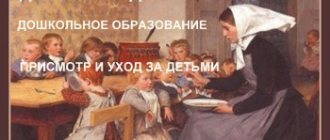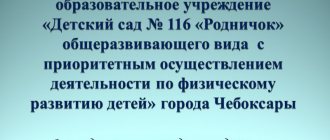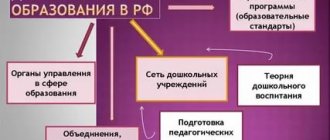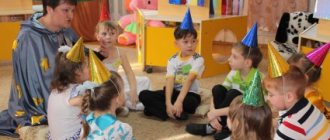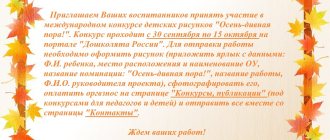Educational program at preschool educational institution
Babaeva Natalia Vladimirovna.
Educational program at preschool educational institution
1 Educational program : concept, structures
An educational program is a document in the form of a normative text that defines the goals and values of education at its corresponding stage, the ways to achieve them, the content of education of a certain level and focus, the amount of permissible workload for students and the requirements for the level of their training. The educational program shows how, taking into account specific conditions, an educational institution creates its own model of training, education and development of students. The educational program of the school is purely individual, as it is designed to take into account the needs of specific students and their parents.
The structure of the educational program is presented in the form of modules. The number and content of modules the educational institution independently based on the specifics of the educational process and the conditions of its organization. A set of modules: goals and values of the educational program ; targeting of the educational program ; educational institution curriculum ; educational software , training programs ; development of Federal State Educational Standards; programs , education system; organizational and pedagogical conditions of the educational process ; technologies of educational process ; expected results of mastering the educational program ; system for diagnosing the results of mastering an educational program ; public and public administration; organizational and methodological conditions of the educational process ; educational code .
The content of the educational program is formed taking into account the requirements of the Federal State Educational Standard for the levels of general education , the educational needs of students and parents, the sociocultural characteristics and needs of the region in which the educational process .
The educational program of a preschool educational institution is considered as a model for organizing the educational process , focused on the personality of the student and taking into account the type of preschool educational institution , as well as priority areas of activity. The basic general educational program of preschool education is developed , approved and implemented in an educational institution on the basis of approximate basic general educational programs of preschool education . The program determines the content and organization the educational process for preschool children and is aimed at the formation of a general culture, the development of physical, intellectual and personal qualities, the formation of prerequisites for educational activities that ensure social success, the preservation and strengthening of the health of preschool children, the correction of deficiencies in physical and (or )
mental development of children.
The content of the Program includes a set of educational areas that ensure the diversified development of children, taking into account their age and individual characteristics in the main areas - physical, social-personal, cognitive-speech and artistic-aesthetic.
The educational program of the preschool educational institution consists of two parts
The mandatory part of the Program must be implemented in any educational institution working according to the basic general education program of preschool education . It ensures that pupils achieve school readiness, namely the necessary and sufficient level of child development for their successful mastery of the basic educational programs of primary general education . In groups of compensatory and combined orientation, the mandatory part of the Program includes activities for qualified correction of deficiencies in physical and (or)
mental development of children with disabilities.
Part II of the Program , formed by participants in the educational process , reflects: the diversity of institutions , the presence of priority areas of activity, including ensuring equal starting opportunities for children to study in educational institutions , carrying out sanitary and hygienic, preventive and health-improving measures and procedures, physical , social-personal, cognitive-speech, artistic and aesthetic development of children (except for activities for qualified correction of deficiencies in physical and (or)
mental development of children with disabilities);
the specifics of national-cultural, demographic, climatic conditions in which the educational process .
The time required to implement the Program ranges from 65% to 80% of the time children spend in groups with a 12-hour stay, depending on the age of the children, their individual characteristics and needs. The volume of the mandatory part of the Program is at least 80% of the time required to implement the Program , and the part formed by participants in the educational process is no more than 20% of the total volume of the Program .
2 Variation of educational programs for preschool children
Basic programs for preschool educational institutions : comprehensive (general developmental)
—
programs aimed at forming universal abilities in a child and developing them to a level corresponding to the age-related capabilities and requirements of modern society ( “Rainbow”
,
“Development”
, Origins”,
“Childhood”
,
“From childhood to adolescence”
, etc.);
specialized (partial, local)
include one or more areas of child development (
“Harmony”
,
“Synthesis”
,
“I am a person”
,
“Young ecologist”
,
“Children’s talent”
,
“Musical masterpieces”
, etc.).
Additional programs for preschool educational institutions - programs in one or more areas to provide additional services outside the framework of the main educational programs in studios , clubs, etc.
The introduction of new regulatory documents has led to significant changes in the organization of educational work of a modern kindergarten, namely the independent activities of the institution in development of the basic general education program . However, the scientific and methodological literature presents in sufficient detail the features of the development of the compulsory part of the main preschool education program : its structure is determined, the necessary content of each structural unit is spelled out. At the same time, the problem of developing a part formed by participants in the educational process (variable) is almost not considered. The development of this part is the creative work of teachers, and educators are free to independently choose the structure and content of their part of the program , focusing on pre-existing requirements for documents of this kind.
Variability remains one of the main features of the new period in the development of software and methodological support for the preschool education in the compulsory part, which is developed at the federal level and implemented by all preschool educational institutions . It is reflected in the choice of topics, forms, means and methods of education , taking into account the individual developmental characteristics of students. In the part formed by participants in the educational process - through the additional volume and content of preschool education in the implementation of priority areas of activity and the specifics of the implementation of the educational process . The variable part of the Program , formed by participants in the educational process , ensures the variability of modern preschool education , and makes up no more than 40% of its total volume, as it reflects: the species diversity of institutions of the preschool education ; the presence of priority areas of activity for the kindergarten that ensure the development of integrative qualities of preschoolers and equal starting opportunities for further education of children in general education institutions ; features of carrying out sanitary-hygienic, preventive and health-improving measures and procedures in a particular kindergarten, taking into account the conditions available to the institution; features of the physical, social-personal, cognitive-speech, artistic and aesthetic development of children of a particular group, taking into account their interests, desires, needs and abilities, as well as the demands of the parent community; the specifics of the national-cultural, demographic, climatic conditions in which the educational process of a particular preschool educational institution is carried out.
Thus , the program , of the educational activities of the kindergarten is updated
The team was faced with the task of developing a variable part with the following priority areas: moral-patriotic, environmental, physical education, health and social (traffic rules, which were named as the most important in the educational process when surveying parents and approved by teachers at the pedagogical council.
3 Participants in the process of implementing educational programs
Participants in the educational process of the preschool educational institution are pupils, their parents (legal representatives, teaching staff. When admitting children to the preschool educational institution, the latter is obliged to inform the parents (legal representatives)
with a charter, a license to carry out
educational activities and other documents regulating the organization of the educational process . The establishment of fees charged to parents (legal representatives)
for maintaining a child in a preschool educational institution is made in accordance with the legislation of the Russian Federation.
Relations between the preschool educational institution and parents (legal representatives)
are governed by an agreement between them, which cannot limit the rights of the parties established by law. The relationship between the pupil and the staff of the preschool educational institution is built on the basis of cooperation, respect for the personality of the pupil and giving him freedom to develop in accordance with his individual characteristics. The procedure for staffing a preschool educational institution is regulated by its charter. The rights of preschool educational institutions employees and measures of their social support are determined by the legislation of the Russian Federation, the charter and the employment contract.
4 The role of parents in the implementation of the tasks of preschool education
Currently, Russian preschool education is going through a difficult , essentially turning point period in its history. The reason for the upcoming changes is well known to teachers and parents - these are changes in the Federal Law “On Education in the Russian Federation”
and the accompanying Federal State
Educational Standard for Preschool Education . The law provides that in solving complex, multifaceted problems related to the implementation of the Federal State Educational Standard for preschool education , an exclusive role belongs to the family. Article 44 of the Law defines for the first time the rights, duties and responsibilities of parents for the education of a child . In accordance with the new requirements, the role of parents in the implementation of the Federal State Educational Standard is increasing both at the level of each preschool educational institution and at the level of the municipal preschool education system as a whole . In this regard, there is a need to take a fresh look at the interaction of preschool educational institutions with parents in order to create a unified educational space “family - kindergarten”
for their equal and interested partnership.
The relationship between kindergarten staff and parents at the present stage is one of the most difficult problems. Historical and pedagogical analysis and analysis of scientific research literature on this topic indicate that preschool teachers educational institution for many years, and have come to the conclusion that only through the joint efforts of the family and kindergarten can the child be helped. There are different views of parents on the cooperation of the preschool educational institution with the family. Many people believe that kindergarten should educate their children. There is a category of parents who neglect the advice of teachers. Some parents believe that their only task is to ensure that the child is fed, clothed, and that his only activity at home is watching cartoons and going for a walk .
The interaction of educators with families of pupils is one of the most important conditions for the formation of a child’s personality and positive results in upbringing, which can be achieved with coordination of actions and subject to the development of parents’ interest in issues of upbringing and education. Cooperation between teachers and parents allows you to get to know the child better, look at him from different positions, see him in different situations, and therefore help in his development. To effectively interact with your family, the desire to cooperate is not enough. The tasks of education and development can be successfully solved only if the kindergarten constantly maintains contact with the family and involves them in its work.
The basis of the interaction between the preschool educational institution and the family is the cooperation of teachers and parents, which presupposes the equality of the partners’ positions, the respectful attitude of the interacting parties towards each other, taking into account individual capabilities and abilities. Cooperation involves not only mutual actions, but also mutual understanding, mutual respect, mutual trust, mutual knowledge, and mutual influence. Active joint work of teachers and parents allows us to get to know each other better and helps strengthen their relationships.
In accordance with the Family Code of the Russian Federation (Articles 63-67)
“Parents have the right and obligation to raise their children.
Parents are responsible for the upbringing and development of their children. They are obliged to take care of the health, physical, mental, spiritual and moral development of their children.” The Federal Law “On Education in the Russian Federation” (Articles 44, 45)
states that “parents
(legal representatives)
of minor students have a priority right to educate and raise children over all other persons.
They are obliged to lay the foundations for the physical, moral and intellectual development of the child’s personality. State authorities and local governments, educational organizations provide assistance to parents (legal representatives)
of minor students in raising children, protecting and strengthening their physical and mental health, developing individual abilities and the necessary correction of their developmental disorders.”
The leading goal of interaction between kindergarten and family is to create the necessary conditions for the formation of responsible relationships with the families of pupils and the development of parental competence (the ability to resolve different types of socio-pedagogical situations related to raising a child); ensuring the right of parents to respect and understanding, to participate in the life of the kindergarten. Parents and educators need to overcome subordination in their relationships with each other, give up the habit of criticizing each other, and learn to see each other not as a means of solving their problems, but as full partners and employees.
The main tasks of interaction between kindergarten and family: studying the attitude of teachers and parents to various issues of upbringing, training, development of children, conditions for organizing various activities in kindergarten and family; acquaintance of teachers and parents with the best experience of education in kindergarten and family, as well as with the difficulties that arise in the family and public education of preschoolers; informing each other about the current tasks of raising and educating children and about the possibilities of the kindergarten and family in solving these problems; creating conditions in kindergarten for that is diverse in content and forms, promoting the development of constructive interaction between teachers and parents with children; attracting families of pupils to participate in joint events with teachers organized in the district (city, region)
;
encouraging parents for their attentive attitude to the various aspirations and needs of the child, creating the necessary conditions for their satisfaction in the family.
Main directions and forms of work with families:
- Mutual knowledge and mutual information.
-Stands.
-Continuing education of raising adults.
-Master classes.
-Joint activities of teachers, parents, children.
-Family holidays.
-Project activities.
In conclusion, I would like to emphasize once again that the family and preschool institution are two important social institutions for the socialization of a child. Without parental participation, the upbringing process is impossible, or at least incomplete. Experience working with parents shows that as a result of the use of modern forms of interaction, the position of parents becomes more flexible. Now they are not spectators and observers, but active participants in the life of their child.
5 Project “guide for parents”
Project “guide for preschool children and their parents “Me, my family, my city”
The purpose of creating a guidebook: to form a child’s own image of his hometown .
Objectives of the guide:
-to form a child’s knowledge system on geography, history, and culture of their hometown;
- to cultivate patriotism and civic feelings in a child based on the development of interest in the history of his family, the history of his hometown;
-contribute to the formation of the position of subjects of activity in the child and each family member;
-introduce to the culture of your people, family traditions;
-increase the value of the family in the eyes of the child;
-promote the establishment of trusting relationships between the child and family members close to him, emotional rapprochement with them;
-promote the development of the child’s coherent speech and replenishment of his active vocabulary.
Problems that the guidebook aims to solve
- the tendency of many parents to withdraw themselves from solving issues of upbringing and personal development of the child;
- disintegration of intergenerational ties, disappearance of family traditions;
- emotional distress of the child, leading to stress, neuroses, and aggressiveness in children;
-distorted ideas about the meaning of human life, true values among the younger generation of raising adults and, as a result, difficulties in educating the younger generation of spiritual and moral life guidelines, including patriotism and citizenship;
-lack of teaching materials for city teachers to study the history, geography, and culture of the city with children;
-lack of accessible literature with developments for parents on studying the history of the city with their children and, as part of it, family history, reviving family traditions and passing them on to their children.
The guide is intended
-for preschool children and their parents, grandparents;
-can also be used by parents when working with children of primary school age;
-will be of interest to kindergarten teachers, social workers, family coordinators, and primary school teachers;
-can serve as a good means of expanding children’s ideas about family in foster care, as well as a means of the most successful adaptation of adopted children into the family.
Features of the guide
-reliance on the personal experience of children gained in practical activities;
-availability of material for preschool children (lack of a large amount of encyclopedic information)
;
-maximum involvement of parents in the work of familiarizing preschoolers with their hometown;
-integration of joint activities of children and parents at home with their activities in a preschool educational institution .
Contents of the guide:
Historical reference;
Family Chronicle;
We have something to be proud of;
Traditions of the city in our family.
3.Requirements of the Ministry of Education and Science
The Law on Education and the Ministry of Education and Science in their letters make a number of requirements for the educational program:
Compliance with Federal State Educational Standards. According to the law on education, the structure (the obligatory part and the component that is formed by the participants in educational relations) and the volume of the educational program must comply with the requirements of the Federal State Educational Standard, which are established by the Order of the Ministry of Education and Science. Several educational programs may be approved in preschool educational institutions for work in groups of different directions (general developmental, compensatory, recreational or combined) or depending on the age of the children. When developing an educational program, it is necessary to determine the amount of time that children will spend in preschool. Educational programs taking into account these data may be different for groups where the length of stay of children differs (short-term, full-time and extended day, round-the-clock stay). Please note that for groups where children spend a full day, the program can be implemented no more than 14 hours a day.
